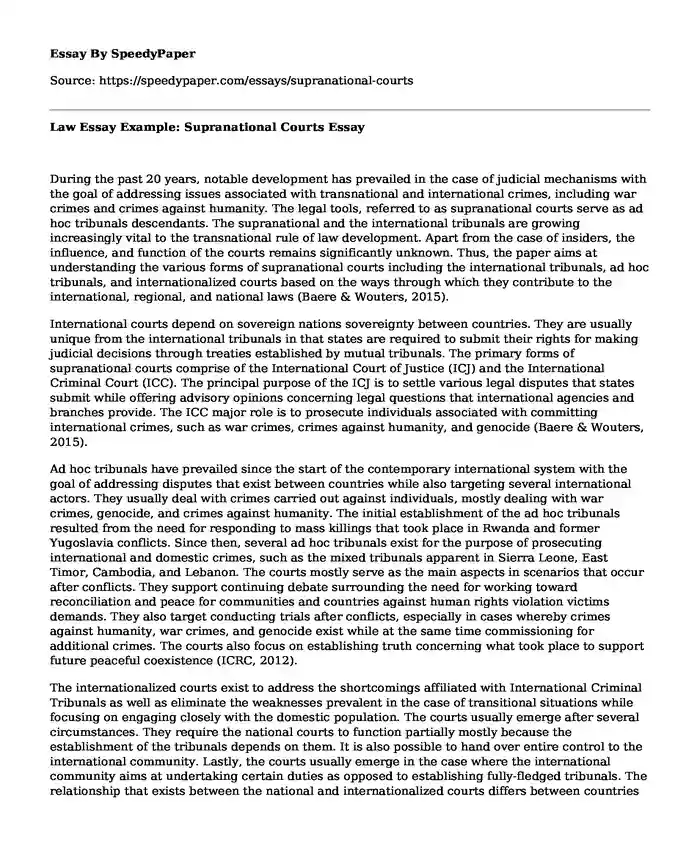
| Type of paper: | Essay |
| Categories: | Law Court system |
| Pages: | 3 |
| Wordcount: | 622 words |
During the past 20 years, notable development has prevailed in the case of judicial mechanisms with the goal of addressing issues associated with transnational and international crimes, including war crimes and crimes against humanity. The legal tools, referred to as supranational courts serve as ad hoc tribunals descendants. The supranational and the international tribunals are growing increasingly vital to the transnational rule of law development. Apart from the case of insiders, the influence, and function of the courts remains significantly unknown. Thus, the paper aims at understanding the various forms of supranational courts including the international tribunals, ad hoc tribunals, and internationalized courts based on the ways through which they contribute to the international, regional, and national laws (Baere & Wouters, 2015).
International courts depend on sovereign nations sovereignty between countries. They are usually unique from the international tribunals in that states are required to submit their rights for making judicial decisions through treaties established by mutual tribunals. The primary forms of supranational courts comprise of the International Court of Justice (ICJ) and the International Criminal Court (ICC). The principal purpose of the ICJ is to settle various legal disputes that states submit while offering advisory opinions concerning legal questions that international agencies and branches provide. The ICC major role is to prosecute individuals associated with committing international crimes, such as war crimes, crimes against humanity, and genocide (Baere & Wouters, 2015).
Ad hoc tribunals have prevailed since the start of the contemporary international system with the goal of addressing disputes that exist between countries while also targeting several international actors. They usually deal with crimes carried out against individuals, mostly dealing with war crimes, genocide, and crimes against humanity. The initial establishment of the ad hoc tribunals resulted from the need for responding to mass killings that took place in Rwanda and former Yugoslavia conflicts. Since then, several ad hoc tribunals exist for the purpose of prosecuting international and domestic crimes, such as the mixed tribunals apparent in Sierra Leone, East Timor, Cambodia, and Lebanon. The courts mostly serve as the main aspects in scenarios that occur after conflicts. They support continuing debate surrounding the need for working toward reconciliation and peace for communities and countries against human rights violation victims demands. They also target conducting trials after conflicts, especially in cases whereby crimes against humanity, war crimes, and genocide exist while at the same time commissioning for additional crimes. The courts also focus on establishing truth concerning what took place to support future peaceful coexistence (ICRC, 2012).
The internationalized courts exist to address the shortcomings affiliated with International Criminal Tribunals as well as eliminate the weaknesses prevalent in the case of transitional situations while focusing on engaging closely with the domestic population. The courts usually emerge after several circumstances. They require the national courts to function partially mostly because the establishment of the tribunals depends on them. It is also possible to hand over entire control to the international community. Lastly, the courts usually emerge in the case where the international community aims at undertaking certain duties as opposed to establishing fully-fledged tribunals. The relationship that exists between the national and internationalized courts differs between countries in diverse aspects, mostly because countries realize their relationships in a different manner. As such, the expanded element has minimal contact with the local judiciary. (Romano, Nollkaemper, & Kleffner, 2016)
References
Baere, G. D., & Wouters, J. (2015). The Contribution of International and Supranational Courts to the Rule of Law. London: Edward Elgar Publishing.
ICRC. (2012). Ad hoc tribunals. Retrieved from https://www.icrc.org/en/document/ad-hoc-tribunals
Romano, C., Nollkaemper, A., & Kleffner, J. K. (2016). Internationalized Criminal Courts and Tribunals: Sierra Leone, East Timor, Kosovo, and Cambodia. Retrieved from http://www.colorado.edu/conflict/peace/example/romano.htm
Cite this page
Law Essay Example: Supranational Courts. (2019, Oct 22). Retrieved from https://speedypaper.com/essays/supranational-courts
Request Removal
If you are the original author of this essay and no longer wish to have it published on the SpeedyPaper website, please click below to request its removal:
- Assignment Example on Organizing a Focus Group Event
- Free Essay with Quantum 9 Limited Company Research
- Invictus Movie Essay Example
- Essay Sample about Brian Skerry: Education and Photographic Training
- Institutional AffiliationPlastic Water Bottle Pollution
- Essay Sample on Coca-Cola and Oligopoly
- Free Essay: Policies and Programs for Children and Families
Popular categories




